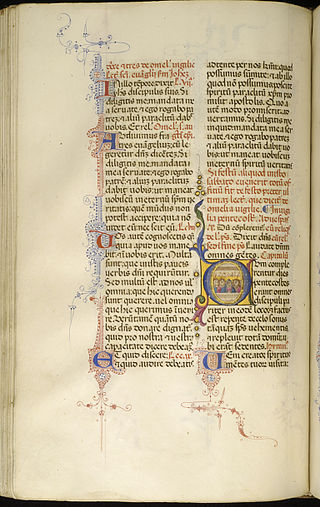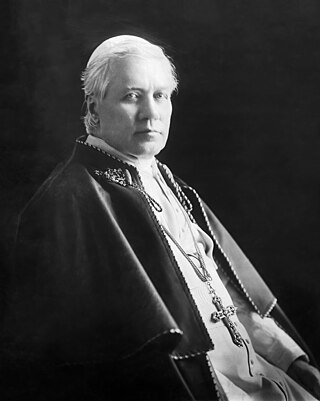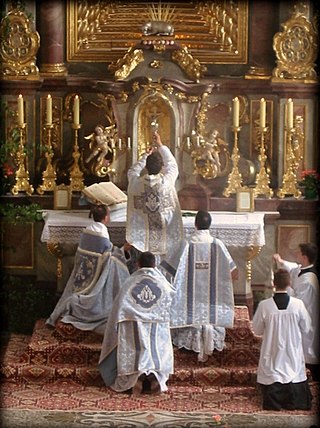
The Roman Breviary is a breviary of the Roman Rite in the Catholic Church. A liturgical book, it contains public or canonical prayers, hymns, the Psalms, readings, and notations for everyday use, especially by bishops, priests, and deacons in the Divine Office.

Sacrosanctum Concilium, the Constitution on the Sacred Liturgy, is one of the constitutions of the Second Vatican Council. It was approved by the assembled bishops by a vote of 2,147 to 4 and promulgated by Pope Paul VI on 4 December 1963. The main aim was to revise the traditional liturgical texts and rituals to reflect more fully fundamental principles, and be more pastorally effective in the changed conditions of the times, clarifying not only the role of ordained ministers but the modalities of appropriate participation of lay faithful in the Catholic Church's liturgy, especially that of the Roman Rite. The title is taken from the opening lines of the document and means "This Sacred Council".

Pope Pius X was head of the Catholic Church from 4 August 1903 to his death. Pius X is known for vigorously opposing modernist interpretations of Catholic doctrine, and for promoting liturgical reforms and Thomist scholastic theology. He initiated the preparation of the 1917 Code of Canon Law, the first comprehensive and systemic work of its kind, which would ultimately be promulgated by his successor. He is venerated as a saint in the Catholic Church.

The Mass of Paul VI, also known as the Ordinary Form or Novus Ordo, is the most commonly used liturgy in the Catholic Church. It was promulgated by Pope Paul VI in 1969 and its liturgical books were published in 1970; those books were then revised in 1975, they were revised again by Pope John Paul II in 2000, and a third revision was published in 2002.

The Tridentine Mass, also known as the Traditional Latin Mass or the Traditional Rite, is the liturgy in the Roman Missal of the Catholic Church codified in 1570 and published thereafter with amendments up to 1962. Celebrated almost exclusively in Ecclesiastical Latin, it was the most widely used Eucharistic liturgy in the world from its issuance in 1570 until the introduction of the Mass of Paul VI.

The Dicastery for Divine Worship and the Discipline of the Sacraments is the dicastery of the Roman Curia that handles most affairs relating to liturgical practices of the Latin Church as distinct from the Eastern Catholic Churches and also some technical matters relating to the sacraments.

Nicola Aloysius Montani, KCSS was a conductor, composer, arranger, and publisher of sacred music.
Liturgical music originated as a part of religious ceremony, and includes a number of traditions, both ancient and modern. Liturgical music is well known as a part of Catholic Mass, the Anglican Holy Communion service and Evensong, the Lutheran Divine Service, the Orthodox liturgy, and other Christian services, including the Divine Office.
Tra le sollecitudini was a motu proprio issued 22 November 1903 by Pope Pius X that detailed regulations for the performance of music in the Catholic Church. The title is taken from the opening phrase of the document. It begins: "Among the concernsof the pastoral office, ... a leading one is without question that of maintaining and promoting the decorum of the House of God in which the august mysteries of religion are celebrated...." The regulations pointed toward more traditional music and critiqued the turn toward modern, orchestral productions at Mass.
The Nouvelle théologie is an intellectual movement in Catholic theology that arose in the mid-20th century. It is best known for Pope John XXIII's endorsement of its closely-associated ressourcement idea, which shaped the events of the Second Vatican Council. It existed most notably among certain circles of French and German theologians.
Frequent Communion is the Roman Catholic practice of receiving the Eucharist frequently, as opposed to the usual medieval practice of receiving it once or a few times a year, by going to mass on Sundays.
Haurietis aquas is an encyclical of Pope Pius XII on devotion to the Sacred Heart of Jesus. It was published on May 15, 1956, to commemorate the 100th anniversary of the establishment of the feast of the Sacred Heart of Jesus by Pope Pius IX.
Summorum Pontificum is an apostolic letter of Pope Benedict XVI, issued in July 2007. This letter specifies the circumstances in which priests of the Latin Church could celebrate Mass according to what Benedict XVI called the "Missal promulgated by Blessed John XXIII in 1962" and administer most of the sacraments in the form used before the liturgical reforms that followed the Second Vatican Council.
Mediator Dei is a papal encyclical issued by Pope Pius XII on 20 November 1947. It was the first encyclical devoted entirely to liturgy.

The 1983 Code of Canon Law, also called the Johanno-Pauline Code, is the "fundamental body of ecclesiastical laws for the Latin Church". It is the second and current comprehensive codification of canonical legislation for the Latin Church of the Catholic Church. The 1983 Code of Canon Law was promulgated on 25 January 1983 by John Paul II and took legal effect on the First Sunday of Advent 1983. It replaced the 1917 Code of Canon Law which had been promulgated by Benedict XV on 27 May 1917. According to canon 6, the 1983 code of canon law abrogates the 1917 code of canon law and any penal laws made under it that are not contained in the 1983 code.

The Pontifical Institute of Sacred Music is an institution of higher education of the Roman Catholic Church specifically dedicated to the study of church music. It is based in Rome, Italy, located in the former Pontifical Abbey of St Jerome-in-the-City.
The Catholic Church utilizes the oldest continuously functioning legal system in the West, much later than Roman law but predating the evolution of modern European civil law traditions. The history of Latin canon law can be divided into four periods: the jus antiquum, the jus novum, the jus novissimum and the Code of Canon Law. In relation to the Code, history can be divided into the jus vetus and the jus novum. Eastern canon law developed separately.
The Eastern Catholic canon law is the law of the 23 Catholic sui juris (autonomous) particular churches of the Eastern Catholic tradition. Eastern Catholic canon law includes both the common tradition among all Eastern Catholic Churches, now chiefly contained in the Code of Canons of the Eastern Churches, as well as the particular law proper to each individual sui juris particular Eastern Catholic Church. Oriental canon law is distinguished from Latin canon law, which developed along a separate line in the remnants of the Western Roman Empire, and is now chiefly codified in the 1983 Code of Canon Law.
Magnum principium is an apostolic letter issued by Pope Francis and dated 3 September 2017 on his own authority. It modified the 1983 Code of Canon Law to shift responsibility and authority for translations of liturgical texts into modern languages to national and regional conferences of bishops and restrict the role of the Congregation for Divine Worship and the Discipline of the Sacraments (CDW). It was made public on 9 September 2017 and its effective date was 1 October of the same year.
Traditionis custodes is an apostolic letter issued motu proprio by Pope Francis, promulgated on 16 July 2021 regarding the continued use of pre-Vatican II rites. It restricts the celebration of the Tridentine Mass of the Roman Rite, sometimes colloquially called the "Latin Mass" or the "Traditional Latin Mass". The apostolic letter was accompanied by an ecclesiastical letter to the Catholic bishops of the world.










